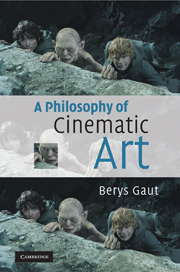6 - Emotion and identification
Published online by Cambridge University Press: 01 March 2010
Summary
There is no doubt of the emotional impact that films can have on their audiences. The nature of that impact varies immensely, ranging from the gut-churning fear produced by an effective horror film to the nuanced emotional landscape of the best films within the European art-cinema tradition. The emotional power of cinema is central to its appeal and value as an art form, and the question arises of how it is achieved. I begin by examining how filmmakers employ aspects of the cinematic medium to foster emotional engagement. I then turn to defend the coherence and the role of identification, one of the most important devices of emotional engagement in cinema, and also show how it produces emotional learning. The discussion in the first four sections chiefly concerns emotion and identification in traditional films. In the last section I examine what difference digital cinema, in particular interactive digital cinema, makes to the ways that we can emotionally engage with films.
EMOTION AND CINEMA
In discussing the emotional power of cinema, I make two assumptions. The first is of the truth of the cognitive-evaluative theory of the emotions. This theory holds that emotions are not simply feelings, as are moods, but that they have an intentional object: I am afraid of something, I hope that something will relieve me from the danger, I pity that man.
- Type
- Chapter
- Information
- A Philosophy of Cinematic Art , pp. 244 - 281Publisher: Cambridge University PressPrint publication year: 2010



